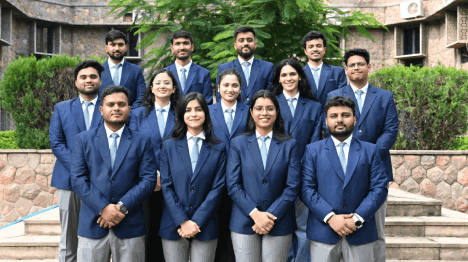- About Us
-
Academics
Schools
Programs
General Information
-
Faculty
The faculty members and researchers working at IIHMR University come from varied backgrounds including, but not limited to medicine, public health, management, economics, statistics, demography, human geography, social and behavioral sciences, rural development and pharmaceuticals.
-
Admissions
- Research
Publications & Journal
- Executive Education
Executive Programmes
- Online Certification Courses
ONLINE CERTIFICATION Courses
- Training
- Placements
- Contact
- Pradanya
- Blog
- Fee Payment
- NAAC
- IQAC
- NIRF
-
About Us
- About IIHMR University
- Board of Management
- Academic Council
- Board of Studies
- Research Board
- Institutional Review Board
- Finance & Audit Committee
- Departmental Research Committee
- Chairperson's Message
- President's Message
- IIHMR University Act
- Infrastructure
- Collaboration
- Ranking
- Board of Studies (School of Digital Health)
- Awards & Accolades
-
Academics
- Institute of Health Management Research
- School of Pharmaceutical Management
- ML Mehta School of Development Studies
- School of Digital Health
- SD Gupta School of Public Health
- MBA (Hospital and Health Management)
- MBA (Pharmaceutical Management)
- MBA (Development Management)
- MBA (Healthcare Analytics)
- Master of Public Health
- Student Manual – Cohort 9 (2021-2023)
- Master of Public Health (Offered by Johns Hopkins Bloomberg School of Public Health, USA in cooperation with IIHMR University, Jaipur, India)
- Ph. D.
- MBA CSR & ESG Management (Executive)
- MBA Sustainable Business Management (Executive)
- Common Information for all the Programs
- Academic Calendar
- Student Handbook 2020-21
- Committees
- Policies
- Annual Exam Calendar
- Library
- Faculty
- Officers of University
- Dean of Institute of Health Management Research
- Dean of School of Pharmaceutical Management
- Dean of School of Development Studies
- Dean of SD Gupta School of Public Health
- Dean of School of Digital Health
- School of Digital Health
- Faculty List A to Z
- Faculty List Designation Wise
- Faculty List School Wise
- Admissions
- Research
- Executive Education
- Training
- Placements
- Alumni
- Events
- Job Openings
- Contact
- Research
Endline Study of the project ‘Health Services for Children and Families during the COVID-19 Pandemic in Delhi & Mumbai’
Agency : Save the Children (SC), India
Objectives:
The primary research objectives of the End line study were to assess:
- To measure the preparedness of health care facilities, ICDS centres and outreach sessions for providing essential MNCHN and COVID-19 services (as described in the Government of India guidelines or state-specific guidelines basis the GoI guidelines)
- To assess the skills, capacities, and challenges of health care providers and ICDS functionaries in providing services related to MNCHN & COVID-19. And training needs assessment for better service delivery.
- To measure the access and use of health services (MNCHN and COVID-19) at healthcare facilities, ICDS centres and outreach sessions by the community (high-risk pregnant and lactating mothers, sick new-born, and under-5 children, suspected COVID-19 Patients)
- To understand community needs, challenges, behaviour, and perceptions on COVID-19 prevention and protection measures, including COVID-19 vaccine, service utilisation and care seeking.
Abstract:
The report evaluates the impact of the COVID-19 pandemic on health services for children and families in New Delhi and Mumbai, focusing on the delivery and access to essential RMNCH services and the readiness of the public health system. The study, commissioned by Save the Children (SC), employed a mixed-methods approach, including surveys and interviews with various stakeholders, and was conducted in December 2021 in five slums of South Delhi and 11 slums of Mumbai's N Ward. The findings reveal that despite the strain on resources and the initial lockdown, health services continued, including ASHA and ANM consultations, and efforts were made to maintain RMNCH and nutrition services. Observations of health facilities and Anganwadi centres (AWCs) indicated adequate supplies and improved functionality post-lockdown. However, challenges such as space constraints in AWCs and the need for PPE kits were noted. Compared to the baseline data, the study observed significant improvements in various health indicators, including ANC, PNC, breastfeeding practices, and immunisation. The administration of the COVID-19 vaccine also saw significant improvement. The report highlights the role of digital tools in education and recommends strategies for social distancing, tracking nutrition, doorstep delivery of services, and continued vigilance on pandemic protocols. It also advocates for increased awareness and implementation of government incentive schemes like JSY and PMMVY. The findings and recommendations guide future interventions and policy decisions to enhance health services for vulnerable populations during pandemics.



